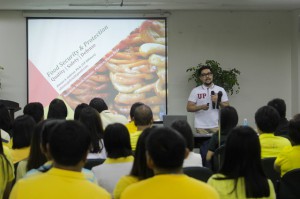In most households and restaurants, rice leftovers typically get spoiled and thrown out. 
Dr. Riza G. Abilgos-Ramos of the Rice Chemistry and Food Science Division (RCFSD) at PhilRice recommends that to prevent spoilage, we should cook rice in smaller quantities at several times of the day to reduce storage.
According to Dr. Alonzo A. Gabriel, a professor and food science expert at UP Diliman, a bacterium called Bacillus cereus that causes food poisoning is present when cooking rice.
“Food-borne diseases and outbreaks start at home due to insufficient knowledge of households in proper food handling,” said Gabriel who gave a lecture titled Food Security and Protection: Updates on Quality, Safety, and Defense organized by RCFSD, 29 July.
Gabriel explained that the bacterium can survive heat while boiling and is most capable of germination and outgrowth after the rice is cooked.
In preventing the said bacterium, Abilgos-Ramos suggested that after cooking, “it is best that rice should either be kept hot (> 63°C) or cooled quickly then transferred to a refrigerator within two hours.”
She added that boiled or fried rice must be stored outside the temperature range of 15-50°C and not under warm conditions.
The seminar was part of the Nutrition Month celebration at PhilRice. Other events conducted in this month-long celebration include a feeding program for elementary students and an institute-wide Zumba competition.




